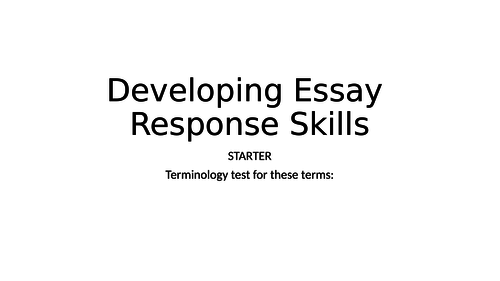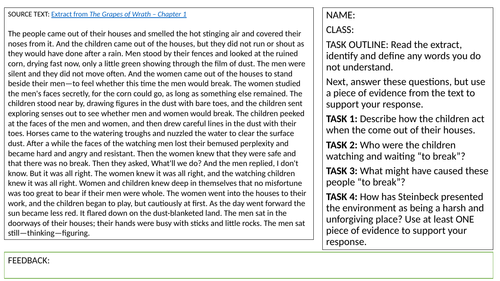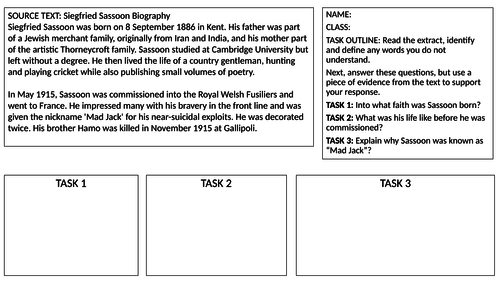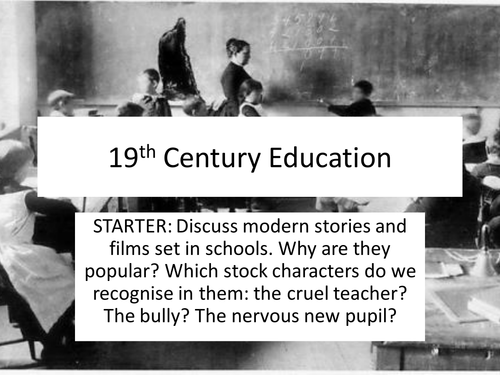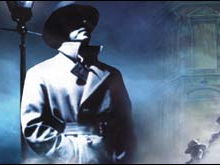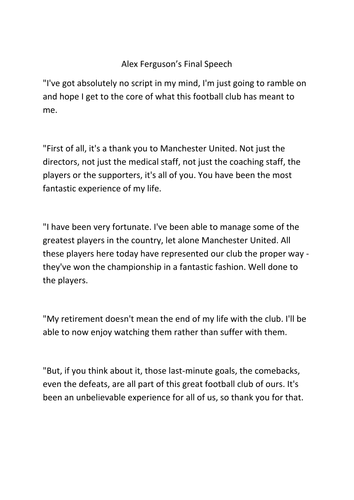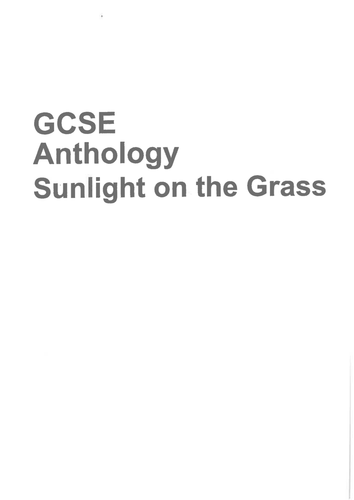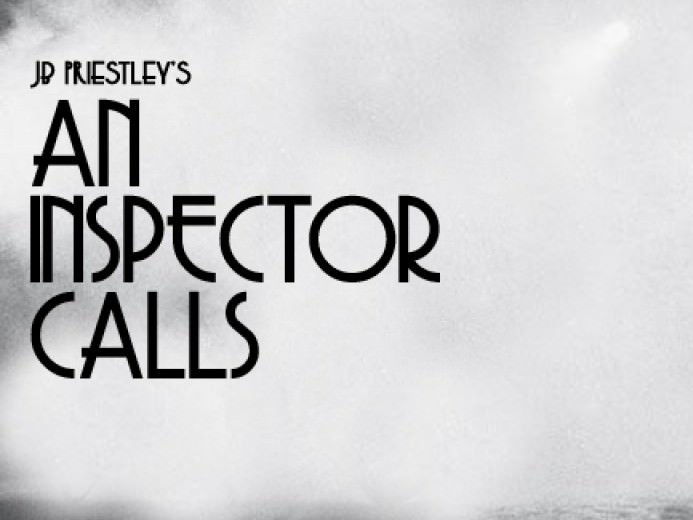
228Uploads
561k+Views
1393k+Downloads
World languages

AQA A-Level English Language and Literature: Othello - Lesson 4 (The Violence Within)
A thematic exploration of Violence within Othello - focusing specifically on Act 4. Also, the power point starts with a little revision of characters and quotations from across the play. I found this a fun lesson.

AQA English Language and Literature: Developing essay response skills to the Paris Anthology section
This is my attempt to engage and develop my Year 12s academic voices in their Paris Anthology related essay responses. The main issue my class had seemed to focus upon when and where to start. What I do is show them how they can place a particular emphasis on one of several potential areas of focus initially. I show them how they could use Mode, Audience, Purpose, each of Grice’s Maxims and each of the different levels of language as a starting point for an analytical response. The attached word document appears to be an “essay”.It isn’t. It’s the collected starting points placed in one document so that the students can focus more on the “how you do it” instead of trying to copy down the best bits.
It worked reasonably well and is suited for a class with similar needs. Hope you find this useful.

KS3: SPaG Understanding a Text Lessons (Focusing on John Steinbeck)
Designed to be taught in support of a Year 9 class doing a GCSE-style task on Of Mice and Men. These powerpoints make good activities as part of a lesson, or they can be printed off as individual worksheets. The worksheet element contains a RAG rating system and some generic targets, suited for peer or self assessment.

KS3: SPaG Understanding a Text Lessons (Focusing on WW1 poets and their background)
This uses a format I’ve used elsewhere. The lessons are designed to support the teaching of conflict poetry from WW1. The goal is that the students sharpen their reading skills and get a boost in their English lessons where the poet is the subject of focus.

KS3: Introduction to 19th Century Literature
A bank of lessons and extracts that introduce Key Stage 3 to a variety of different 19th Century Literature texts. Designed with a top set year 8 class in mind. Draws heavily from the AQA material - look at this as either a time-saver or a starting point.
ADDITION: These lessons are intentionally “light” in terms of their content - the main aim of this unit was to get the students to read the extracts and to ask questions about them. As a result, the lessons I’ve built contain gaps that allow me to react to the needs of the kids. If your intention is to purchase these lessons, please recognise that you will need to fill these gaps yourself. The lessons were only ever intended as a starting point.

KS3: An Inspector Calls (introduction to the GCSE Literature paper)
A bare bones SoW that focuses on introducing the Literature aspect of study at KS3, but assesses the students on a piece of creative writing. The lessons assume you have a copy of the text for students to follow. Look at this as a starting point.
Designed with a bottom set in mind.

AQA English Language Paper 2 Section A Revision Lesson
A single power point designed to be taught as a walking-talking mock examination. This can extend over several lessons - I predict you'll need at least three to do this justice. The source materials are included.

Exploring Political Speeches (based around the old AQA English Language Spoken Language criteria)
I had SO much fun with this unit of work! It helped that the TA in my class went on to become a local MP for Labour (still is as far as I can tell...). Essentially, this series of 5 lessons - which, by the way, totally went over the 5 lessons I gave myself to teach this - explores a number of different political speeches. Included in the pack are a number of transcripts - Martin Luther King's "I have a dream" speech, Alex Ferguson's farewell speech, Bush's post-911 address to the nation and the transcripts of Clegg, Cameron and Brown from the First Televised General Election Debates (heavy stuff).
I was a little tentative at teaching this to a bottom set year 9 class, but they totally got on board with the debates (they tore shreds out of Brown...) and engaged well with the controlled assessment task at the end.
I know that the controlled assessments are now null and void (a shame really), but the exploration of speeches might be useful to someone out there in the teaching ether...

Sunlight on the Grass Revision Booklet
I designed this for the old AQA specification. Now that the spec is obsolete, some of you might be thinking of turning those stacks and stacks of anthologies into resources for KS3 classes (we certainly are for year 9). As a result, you may find this booklet useful.
The booklet is essentially a copy of the entire anthology where on the left hand side of a double page spread you have the text, and on the right hand side you have space for notes. Each story is ended with generic questions and has TWO exam questions for revision purposes.
Perfect for planning lessons when you are taking an extended period of time off.
Happy reading.

KS3 Northern Lights Complete Unit of Work (Focus on creative writing)
Numerous lessons (though as you’ll see they can be expanded/contracted as meets your need) surrounding the teaching of Phillip Pullman’s Northern Lights (a quite awesome book) to a Key Stage 3 class. I taught this unit to a top and bottom set and got a lot out of it in terms of enjoyment and successful creative writing.
I will be using it as a starting point for a reading assignment with very little modification.
May your daemon guide you well.
ADDITION: I have adapted the material to be more focused on GCSE Language creative skills, and incorporated material drawn from the BBC series His Dark Materials. The “newer” lessons are aimed for higher ability students and deal with some more specific creative writing issues like dialogue.

AQA English Language Paper 2 Revision Pack (London 2012 vs The Great Exhibition)
Two powerpoints (both alike in dignity…); the larger of the two covers the deconstruction of an English Language Paper 2 Section A mock exam - we go through common mistakes, areas of concern and identify how to improve on what we’ve done. I’ve provided the sources too, so you could use this as the basis of a Section A walking-talking mock; the smaller powerpoint covers speech writing, an area my lot particularly struggled with.
Happy hunting…

AQA English Literature DNA resources
There doesn't seem to be much out there for DNA, which is a shame really as it's a great text to study. Attached are ALL of the DNA resources I have created; hopefully this will give you a few different ideas and starting points.
This is a mish-mash of resources from three years of teaching this text across two schools. Some organising and sifting-through is needed here.

AQA A-Level English Language and Literature - Introduction to Poetry (Heaney)
My introduction unit for A-Level Language and Literature. It assumes that the academic voices of the students needs sharpening somewhat. I source a lot of stuff from various corners of the net and use it in the power points - pay particular attention to the notes element of the power points by the way. I also include a “model essay” the purpose of which is to get the students to move away from their formulaic essay structures that they have used in their GCSEs.
Think of this as a starting point that may need a little shaping to suit the needs of your class.

KS3: Introduction to KS3 Reading skills - Harry Potter focused
An introductory unit suitable for Year 7 students - I taught it to top and bottom set (with differentiation) classes. It is designed to get kids using the basic PEE style structure to create a reading assessment-worthy response. I don't include all of the extracts I used - I photocopied straight from the texts in all honesty - but this is more than enough to get going.
Hope you find this useful.

AQA English Literature Paper 2 Modern Texts: An Inspector Calls (Higher ability student focused)
A series of lessons that I taught to top set KS4 students. Please note, the gaps between the first and fourth lessons are intentional as I had the students act out the play and answer the comprehension questions in the AQA Study Guide book.

AQA English Language Paper 1 Resources - based upon 100% Perfect Girl
A few things first: the mock exam can be found elsewhere on in my resources and I base the lessons off a similar series of lessons focused on Anil. The difference here is that these lessons are very much targeting higher ability students - all of the success criteria draws from the top end of the mark criteria.
I found this series of lessons to be really useful as a way of establishing the skills required to answer each of the Section A questions. The lessons focus less on exam strategy and more on understanding what is required in relation to each question. The kids found it useful.

AQA English Language Paper 1 focused writing tasks
A couple of lessons that focus on improving creative writing skills. I allude to tasks that have already been completed by the students - you can easily edit these to reflect your own tasks. Particularly pleased with the descriptive writing task as it got a bunch of lads who don’t “do” creative writing to talk about their feelings.

AQA English Language Paper 1 Section A Talking Mock Exam
A talking mock lesson (two hours long) with strategies on the slides for the students to refer to and time limits identified. The idea is that prior to each question, you are to remind students of how to answer the question. The expectation is that the class will have attempted a Paper 1 Section A beforehand - this is the lesson where they try and beat their previous scores. A quick word of warning: the exam paper is available elsewhere in my shop.

AQA English Literature - A Christmas Carol: Complete Unit of Work
The lessons are designed to tie in specifically with the Scholastic Classics version of the text OR the Collins Classroom Classics version, but it wouldn’t take too much to use this with any version to be honest.
Visually, the powerpoints are designed to be eye-catching. Each one is loaded with links to videos, layered with animations and suitably spooky xmas music.
The lessons are ordered via number for your convenience. There is a specific focus on each of the GCSE Assessment Focuses, starting with AO3 (It makes sense, to me at least, to contextualise the story prior to reading it).
The stave lessons each contain definitions of the archaic words (though there is a definite backing off with this the further in you get: as the students get more familiar with the language, they’ll need less prompting with decoding it), as well as a particular focus on key quotations. There are comprehension questions layered throughout, and the first THREE of the stave lessons have an ending task that links to a type of question found in AQA English Language Paper 1 Section A - my class had previously focused on this unit and it made sense to me to keep these skills “hot” so to speak.
The AO specific lessons tie in with the Assessment Objectives for the English Literature course. The AO1 and AO2 lessons assume that the students have read the entire text.
Finally, the theme lessons build towards the students sitting a GCSE Literature style assessment.
I have sourced a lot of ideas from the following pdf file - I wouldn’t feel comfortable trying to pass these ideas off as my own; I include the link so that any person might have the benefit of this resource without having to pay for mine:
http://drbacchus.com/files/christmas_carol/glossary.pdf
There’s about 30+ hours worth of teaching materials in here; enjoy!

A Level English Language and Literature: Paris Anthology
These resources assume prior knowledge on the part of the students - they will have covered the greater majority of the texts before hand.
The lessons go back and fill in the gaps. I try a few different things here in terms of approach. The "Mike and Sophia" extract guide is a guided annotation lesson; I'd be interested to see how classes respond to this.


